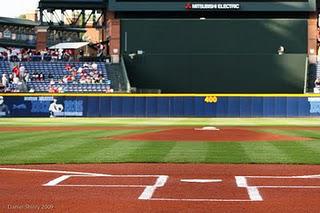Most every team at the lower levels takes pre-game infield/outfield practice. Here is a tip for catchers during this pre-game routine.Find out how the ball bounces.
Seeing how a throw bounces in front of home plate is
not something you want to find out with a runner
approaching and the game on the line.
One of the problems that catchers have during pre-game infield/outfield is that many throws to home plate from the outfield are not able (or allowed) to continue straight through to the catcher. Many, if not all of them, are cut-off by fielders and then thrown home to the catcher. This can be a problem because the catcher is unable to see how balls bounce in front of the plate. Obviously, this is more of a problem on away fields where a player is unsure how the field plays. As a result, the first time the catcher sees a ball bounce in front of the plate on a throw from the outfield tends to be during the game, sometimes at a very important time during the game. Catchers should know how the field plays well prior to any play during the game. There are three easy ways to help catchers get this valuable information during infield/outfield practice.Give permission. Tell your catchers to let a few balls go straight through and not be cut-off. Some catchers just get into the habit of saying “cut, home!” and never get the chance to see how balls bounce in front of the plate area. Are they true hops? Do they skip and seem to pick up speed on the hop? Does the ball slow down considerably on the hop? Do they bounce erratically? This is information the catcher needs to know before a real play develops. Give outfielders a chance. Sometimes coaches just hit balls to the outfielders that are too far for them to be able to reach the catcher with a throw. When hitting balls to outfielders to practice throws to home plate, coaches should give them a chance to reach the catcher with a one hop throw. To accomplish this, give each outfielder at least one ball that has to be charged in order to get to. This shortens the distance of the throw to home plate and allows the throw to travel straight through the cut-off man to the catcher. This not only helps the catcher read the bounces, it also shows the outfielder that his throws need to have enough on them to carry all the way to the catcher on a hop.Force them to wear a mask. My catchers are required to wear their mask anytime a ball is being thrown to home plate. The first obvious reason is safety. The catcher never knows how a ball will bounce until it does. Therefore, the threat always exists of a throw bouncing wildly and hitting a catcher in the face. The second reason is more practical. To help protect themselves on a possible collision with a runner trying to score, a catcher should always have his mask on during plays at the plate and needs to get used to seeing and receiving throws while looking through the bars of the mask. If he should be wearing the mask in the game, he should be required to wear it in practice as well.


